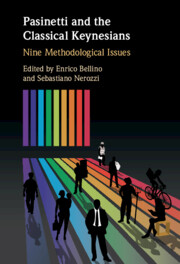Book contents
- Pasinetti and the Classical Keynesians
- Pasinetti and the Classical Keynesians
- Copyright page
- Contents
- Contributors
- Foreword
- Introduction
- 1 Reality (and Not Simply Abstract Rationality) as the Starting Point of Economic Theory
- 2 Economic Logic with Internal Consistency (and Not Only Formal Rigour)
- 3 Malthus and the Classics (Not Walras and the Marginalists) as the Major Inspiring Source in the History of Economic Thought
- 4 Non-ergodic (in Place of Stationary, Timeless) Economic Systems
- 5 Causality vs. Interdependence
- 6 Macroeconomics before Microeconomics
- 7 Disequilibrium and Instability (Not Equilibrium) as the Normal State of the Industrial Economies
- 8 Necessity of Finding an Appropriate Analytical Framework for Dealing with Technical Change and Economic Growth
- 9 A Strong, Deeply Felt, Social Concern
- 10 Why the Classic-Keynesian Trend May Be of Interest to a Young Scholar Today
- 11 Pasinetti’s Separation Theorem
- Author Index
- References
4 - Non-ergodic (in Place of Stationary, Timeless) Economic Systems
Considerations Suggested by Joan Robinson’s Distinction between Two ‘Notions’ of Time in Economic Theory
Published online by Cambridge University Press: 17 February 2022
- Pasinetti and the Classical Keynesians
- Pasinetti and the Classical Keynesians
- Copyright page
- Contents
- Contributors
- Foreword
- Introduction
- 1 Reality (and Not Simply Abstract Rationality) as the Starting Point of Economic Theory
- 2 Economic Logic with Internal Consistency (and Not Only Formal Rigour)
- 3 Malthus and the Classics (Not Walras and the Marginalists) as the Major Inspiring Source in the History of Economic Thought
- 4 Non-ergodic (in Place of Stationary, Timeless) Economic Systems
- 5 Causality vs. Interdependence
- 6 Macroeconomics before Microeconomics
- 7 Disequilibrium and Instability (Not Equilibrium) as the Normal State of the Industrial Economies
- 8 Necessity of Finding an Appropriate Analytical Framework for Dealing with Technical Change and Economic Growth
- 9 A Strong, Deeply Felt, Social Concern
- 10 Why the Classic-Keynesian Trend May Be of Interest to a Young Scholar Today
- 11 Pasinetti’s Separation Theorem
- Author Index
- References
Summary
Our comment to Pasinetti’s fourth point starts from Robinson’s distinction between ‘logical’ and ‘historical’ time and from the critique based on that distinction that she addressed to both the neoclassical and the classical theory of value and distribution. We find that there are two sides to Robinson’s critique: one by which that critique can legitimately be addressed to both theories, but that should be rejected; and the other, that with one reservation should be accepted but that has to do with the specific nature of the neoclassical theory inasmuch as this theory is based on demand and supply curves. Moving to further questions with a ‘chronological’ dimension, we argue that the interpretation which is sometimes proposed of the classical theory as a theory aimed at determining single ‘pictures’ of the economic system taken at different ‘points of time’ should also be rejected. Finally, we point out that the distinction between two notions of time reappears in the neo-Walrasian reformulation of the neoclassical theory, where, differently from what happened in Robinson’s case, it has the effect of obscuring the very possibility of comparing that theory with alternative economic theories.
Keywords
- Type
- Chapter
- Information
- Pasinetti and the Classical KeynesiansNine Methodological Issues, pp. 79 - 111Publisher: Cambridge University PressPrint publication year: 2022

